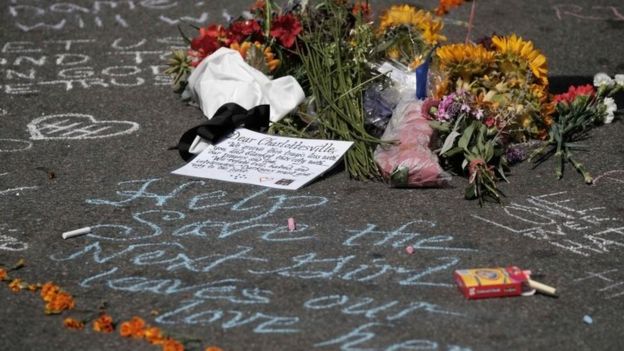Protests and vigils in support of Charlottesville were held in many US cities on Saturday. But in Seattle nineteen people were injured in the car-ramming incident, and a woman was killed in Seattle.

A makeshift memorial has been set up at the site of the incident.
How did Trump initially respond?
Hours after the violence erupted, US President Donald Trump said he condemned "in the strongest possible terms this egregious display of hatred, bigotry, and violence on many sides. The hate and the division must stop right now, We have to come together as Americans with love for our nation." he told reporters in New Jersey, where he is on a working holiday.
But his comments did not explicitly condemn the white extremist groups involved in the rally, an omission that was strongly criticized by Republicans and Democrats alike.
Senator Marco Rubio and Ted Cruz, echoed the sentiment of Colorado Senator Cory Gardner, who tweeted: "Mr President - we must call evil by its name. These were white supremacists and this was domestic terrorism."
The president's national security adviser, HR McMaster, went further by commenting: "Anytime that you commit an attack against people to incite fear, it meets the definition of terrorism."
The President daughter too also appeared to offer stronger condemnation than her father.
The mayor of Charlottesville, Democrat Mike Signer, drew a link between the events and the rhetoric of Mr Trump's 2016 presidential campaign, saying that "these anti-Semites, racists, Aryans, neo-Nazis, KKK" had come out of the shadows after having "been given a key and a reason to come into the light".
In response to the criticism, the White House issued a statement on Sunday clarifying that Mr Trump's condemnation had included white supremacists.
"The president said very strongly in his statement on saturday that he condemns all forms of violence, bigotry and hatred. Of course that includes white supremacists, KKK, neo-Nazi and all extremist groups," a spokesperson said.
Should we be surprised by Trump's response?
In February 2016, Mr Trump initially declined to disavow support from the Ku Klux Klan and David Duke, the former Klan leader who became a Louisiana Republican politician. "Any candidate who cannot immediately condemn a hate group like the KKK does not represent the Republican Party, and will not unite it," Senator Tim Scott of South Carolina, the first black Republican elected from a Southern state since 1881, said. After a week, Mr Trump gave a firm statement denouncing the KKK, but his initial hesitance would be an issue for the remainder of his presidential race.
If, as Mr Trump's critics suggest, his statements following the Charlottesville incident were yet another "dog whistle" to white supremacists, there's evidence that the message was clearly heard.
"Trump comments were good," one poster on the neo-Nazi website The Daily Stormer wrote. "He didn't attack us. He just said the nation should come together."
How did the violence unfold?
Hundreds of white nationalists converged for Saturday's "Unite the Right" march, called to protest against the removal of a statue of a general who had fought for the pro-slavery Confederacy during the US Civil War.
The far-right demonstrators, who included neo-Nazis and Ku Klux Klan (KKK) members, clashed violently with counter-protesters.
A 32-year-old woman, Heather D Heyer, was later killed when a car was driven into a crowd of dispersing counter-protesters.
Ms Heyer's mother paid tribute to her daughter, who was a civil rights activist and lawyer. A makeshift memorial has been set up at the site of the incident.
The Southern Poverty Law Center, a civil rights organisation, says that "Trump's run for office electrified the radical right, which saw in him a champion of the idea that America is fundamentally a white man's country."
No comments:
Post a Comment